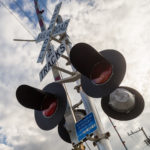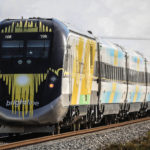To the best of my recollection, I’ve never met Indian River County Commissioner Bob Solari. And until the other day, I had never spoken with him.
Somehow, though, the two of us, after independently delving further into the proposed All Aboard Florida project and its ties to Florida East Coast Industries and the Fortress Investment Group LLC, arrived at the same conclusion.
“It’s not about passenger rail service,” Solari said by phone from his island home.
It’s about freight trains.
More of them – a lot more.
In fact, with a widening of the Panama Canal projected to double the ocean-linking waterway’s shipping capacity in a year or two, we can expect to see freight-train traffic through our communities double, and possibly triple, in the not too distant future.
Is that why Fortress, which owns FECI, is so eager to embark on its plans for All Aboard Florida?
Is it possible Fortress wants to use Federal Railroad Administration loans and loan guarantees to build and upgrade the tracks needed to accommodate additional freight trains, all under the guise of providing high-speed passenger service from Miami to Orlando?
“That’s all opinion, on my part,” Solari said.
Same here.
Just an opinion.
It’s an opinion, however, based on what we’ve learned about Fortress and FECI and the big bucks being spent to expand the Port of Miami – the closest U.S. container port to the Panama Canal – and restore the rail line that connects the rail yard in Hialeah to the port.
It’s an opinion based on facts, circumstances and suspicions our local, state and federal representatives ought to investigate before All Aboard Florida gets rammed down our throats, forcing us to endure passenger trains hurtling through our community at 110 mph 32 times between 7 a.m. and 10 p.m. each day.
“When the canal is widened, there’s going to be a lot more freight coming through Miami and Fort Lauderdale,” Solari said, “and the railroad is going to need more track capacity to move it.”
That’s why there also are plans to expand Fort Lauderdale’s Port Everglade, where the goal is to create a ship-to-rail transfer facility for cargo containers.
There’s a lot of money to be made hauling freight up Florida’s east coast – far more than can be made transporting passengers.
Now consider how little of its own money FECI will need to invest in the $1.5 billion All Aboard Florida project, which would be entirely or heavily funded and financed by federal and state revenues, loans and loan guarantees.
Having already received a $215 million pledge from Gov. Rick Scott to help build a new All Aboard Florida terminal at Orlando International Airport, FECI has applied for a $632 million loan through the Federal Railroad Administration to upgrade the stretch of tracks from Miami to West Palm Beach. The company is expected to seek another $868 million in federal loans to enhance the tracks from West Palm Beach to Cocoa and build a new line from Cocoa to Orlando.
If those loans came through – and there’s no good reason to believe they wouldn’t, given the FECI’s political connections – simple math tells us the rail company wouldn’t have much of a stake in the game. Fortress would have everything to gain and very little, if anything, to lose.
And that’s a dangerous proposition for the taxpayers.
Think about it: If All Aboard Florida became a reality, then becomes the boondoggle many of us predict it would be, the company could eventually claim it is unable to continue its passenger operations without more government subsidies, walk away from a money-losing venture, default on those loans and stick taxpayers with the debt.
That would be disastrous.
Worse, though, would be such a scenario being part of some dastardly but lucrative plan.
“I’ve had growing concerns about All Aboard Florida since I attended the Treasure Coast Regional Planning Council meeting last month,” Solari said. “They’re not willing to share their economic benefits statement and won’t tell us how much of their money is going into this. They say they don’t have to because they’re a private company. Yet they want government loans, which puts the taxpayers at risk.
“I came away from that meeting feeling the All Aboard Florida rep was being evasive, that he was hiding something and being disingenuous. So, with more and more citizens expressing their opposition, I started talking to more and more people in the community and gathering more and more information on the companies.
“The more I’ve looked at this thing, the more I found myself asking: ‘Who is this for?’”
Good question.
A better question is: Who, exactly, is All Aboard Florida?
“I don’t know who we’re talking about anymore,” Solari said. “You’ve got the Fortress Investment Group, which is the parent company, and you’ve got Florida East Coast Industries. But there’s also a Florida East Coast Railway. And I’ve recently found a Florida East Coast Holdings Corp.
“I’ve told the county attorney this is something we need to work on,” he added, “because it’s tough to tell who owns anything.”
So could All Aboard Florida be nothing more than what Solari called a “shell corporation,” a company that serves as a vehicle for business transactions without itself having any significant assets?
Could the high-speed passenger rail project be nothing more than a ruse to acquire the federal funding needed to upgrade and build the additional tracks necessary to handle an increase in freight traffic?
Is it possible All Aboard Florida could someday shut down operations and default on its federal loans, while allowing Fortress and/or FECI to retain and profit from ownership of the tracks?
Certainly, there’s cause for skepticism, even suspicion – especially with the All Aboard Florida folks being so reluctant to provide us with much of the information our local and regional government officials have requested.
“This project would do great damage to our way of life,” Solari said. “It would impact us in a half-dozen ways we know of and another half-dozen ways we haven’t thought of yet.”
One of those ways might be the additional traffic stoppages caused by the increase in the number of slower-moving freight trains passing through our city and county after the Panama Canal widening is completed. Imagine having our railroad crossings blocked 40 to 50 times each day.
Let there be no doubt: We must derail this debacle before it wreaks havoc on our Rockwellian community and destroys our peaceful, small-town quality of life with traffic backups, blaring horns, delayed emergency vehicles, public safety hazards along the tracks and the likely drop in property values in neighborhoods in close proximity to the road crossings.
But can we?
“I’m two things – naïve and optimistic – but I believe we can stop it,” Solari said. “It’s going to take a ‘we’ to do it. If the citizens support their local officials, rise up and get involved by contacting their state and federal representatives, this thing can be fought.”
The Vero Beach City Council, no longer resigned to the inevitability of All Aboard Florida, ordered the draft of a resolution opposing the project last week, stating that there should be no state or federal funding or underwriting of the private enterprise.
County commissioners, meanwhile, voted to seek more information about the project than All Aboard Florida has offered thus far. They also:
— Asked the FRA to extend from 45 to 90 days the period granted to local residents to review and comment on the required environmental impact statement, which is expected to be made available in the next couple of weeks.
— Urged the FRA to offer no special rates or deals regarding loans, leases and guarantees to the rail company.
— Requested that All Aboard Florida make its financial records and projections public.
Working along with local governments – and forming another front in the fight against the project – are citizens groups, such as the Vero Beach-based American Coalition 4 Property Rights and Stuart-based Florida NOT All Aboard, which has scheduled a May 4 rally at which Solari has been invited to speak.
In the meantime, Solari said he hopes to meet this week with Rusty Roberts, FECI vice president for corporate development, and press for more information about All Aboard Florida. He’ll also broach his reasons for being skeptical, even suspicious.
Right now, the idea that the passenger trains are simply a stalking horse for dramatically expanded freight service is merely his opinion.
It’s also mine.






